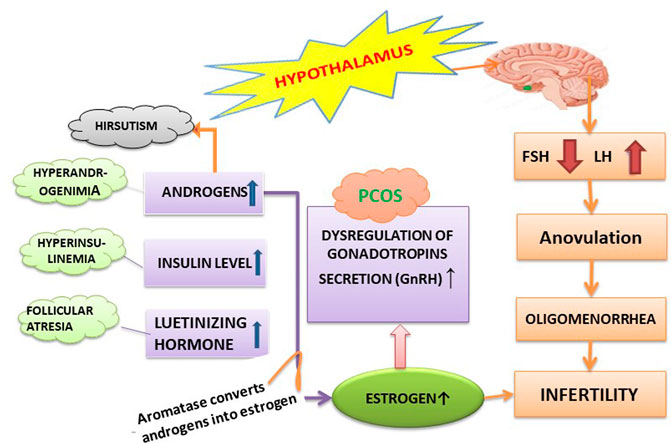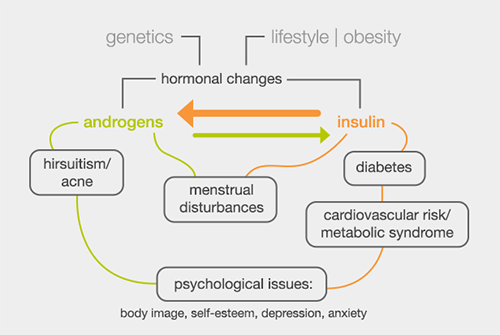PCOS and menopause are both caused by hormones, but menopause doesn’t make PCOS go away. You may still have some PCOS symptoms when you reach menopause, in addition to menopause symptoms. Read on to find out more about PCOS, best PCOS supplements and what you can expect as you get closer to menopause.
Science Behind PCOS
In women of childbearing age, polycystic ovarian syndrome affects one woman out of every ten (PCOS). The exact cause of the condition, which affects hormone levels, is not known. Women with PCOS make too much male hormone (androgen).
A number of symptoms, the most common of which are acne, weight gain, too much hair growth (especially on men’s faces and chins), skin tags or darkening of the skin (in places like the neck creases, groin, and under the breasts), and hair loss (especially on the scalp, as in male-pattern baldness).
PCOS and Menopause
If you have polycystic ovary syndrome (PCOS), your body will go through several changes as you approach menopause in your forties. Regularity in your menstrual cycles is something you can anticipate. On average, women with PCOS experience menopause two years later than their peers without the PCOS condition.
Menopause Cure PCOS?
Does PCOS go away after menopause? No, not in quite that way. Menopause lowers progesterone and estrogen levels, but for women with polycystic ovary syndrome (PCOS), this does not alleviate the negative effects of having an excess of PCOS testosterone. However, studies show that the decline in PCOS testosterone levels in women with PCOS condition does not begin until nearly 20 years after menopause.
Because PCOS condition reduce the body’s sensitivity to insulin, it raises blood sugar levels. Since PCOS condition already causes your body to produce too much PCOS testosterone and other male hormones, this might exacerbate your condition. Menopause causes weight gain, which in turn can raise insulin resistance, making it more crucial to monitor both body fat and glucose levels.
A diagnosis of PCOS condition is typically made in a woman’s twenties or thirties. However, PCOS is not limited to appearing during a woman’s childbearing years; it is actually rather frequent for women to experience its onset throughout the transition to menopause.
Since PCOS condition affects so many different body systems and the underlying hormonal imbalance doesn’t correct itself for years, the same health concerns are present today as they were then such as.

Diabetes
High blood pressure
Unhealthy cholesterol levels
Sleep apnea
Depression and anxiety
Endometrial cancer
Obesity
Chronic inflammation
Stroke
Although age, perimenopause, and menopause all contribute to an increased risk of diabetes, stroke, heart attack, and weight gain (which we should all be aware of), women with PCOS have an even greater risk.
How to Manage PCOS?
The answer to the question of whether PCOS condition will go away by itself once a woman reaches menopause depends on her unique circumstances. After menopause, PCOS symptoms may disappear for some women while persisting for others, or even causing new symptoms to appear. Here are some ways that you might be able to deal with PCOS condition after menopause:
Weight loss: Weight loss can help PCOS symptoms and fertility, so try to keep the pounds off if you can. Symptoms of polycystic ovary syndrome (PCOS) can be made worse by postmenopausal weight gain, which is prevalent owing to changes in metabolism and hormone levels. Women with PCOS condition should make an effort to eat well and exercise often to keep their weight in check.
Control Insulin: Control your insulin levels; PCOS condition patients often experience insulin resistance, which can result in elevated insulin and glucose. Women with PCOS should control their insulin levels through food, exercise, and medication if necessary because insulin resistance tends to grow with age and weight gain.
Medications: If you are taking medication or best PCOS supplements to treat PCOS, it is essential that you keep taking the best PCOS supplements even after menopause has set in. If your symptoms or prescription requirements change, be sure to let your doctor know.

Ask Help: Asking for help from healthcare professionals can help you deal with PCOS after menopause. Women can talk about their problems and share ways to deal with them in support groups and counseling.
The Bottom Line
PCOS, contrary to popular belief, is shown to continue after menopause. A rise in overall body fat, and especially abdominal fat, has been linked to the hormonal shifts that accompany menopause. Due to PCOS, the increased risk of metabolic abnormalities and cardiovascular disease associated with being overweight is much more pronounced. Important steps should be taken with the PCOS healthcare team to implement a regimen to track these potential future problems.
Even if menopause is still a way off, it’s smart to start thinking about how to lower your risk now so you can make the necessary lifestyle changes and keep an eye out for potential difficulties down the road. Balancing your hormones at every stage of life is very important.
You can enroll with us for our Hormone Balance Program.
RD Neha Kava
Latest posts by RD Neha Kava (see all)
- Cold Pressed Juices Benefits - October 20, 2024
- Anti-Aging food & diet tips - October 18, 2024
- Tips To Gain Weight Naturally - October 16, 2024




